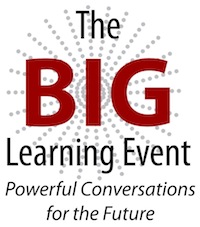Bright minds and big ideas to come together at second Big Learning Event
In June 2011, some 330 participants attended the first Big Learning Event (BLE), jumping into a mosh pit of minds and ideas for unbridled thinking and questioning. Led by some of the world’s brightest minds from disparate disciplines, attendees developed ideas for campus and forged new boundary-busting connections.

In response to the impact and popularity of the first event, a second BLE will take place June 5-6 at the Gordon Dining & Event Center, 770 W. Dayton St.
“Big Learning Event: Powerful Conversations for the Future” will have big speakers, big ideas and big opportunities, according to Harry Webne-Behrman, a training officer with the UW–Madison Office of Human Resource Development and member of the event’s design team.
“The first BLE was an amazing event that truly transformed many participants’ perspectives on their work, key issues we face together, and approaches to those issues that are possible,” Webne-Behrman says. “A really powerful sense of community emerged, one that persisted into other learning beyond the BLE. For all of us on the design team, it was a powerful affirmation that we had come upon a great approach and that we wanted to try to sustain it.”
Just as with the first BLE, the event will turn the traditional conference model on its head by posing just a few questions. For the speakers: What issues are on your minds? Why? For the university community: How might these issues affect how we work and adapt to change?
Big questions, sure, but attendees will arrive at answers with help from guest speakers. BLE organizers have gathered a mix of leaders and thinkers who are open to new ideas and approaches to learning: environmentalist Saleem Ali; artist and writer Lynda Barry; physician and researcher Molly Carnes; astronomer Jill Tarter; and social learning theorist Etienne Wenger-Trayner.
Throughout the event, the guest speakers will offer and reflect on their expertise while attendees can react, respond, pose questions and offer solutions. UW–Madison’s Patrick Sims and Kathy Cramer Walsh are event moderators.
The event structure includes a presentation from each speaker, facilitated conversations among the speakers and audience, concurrent in-depth breakout sessions with each speaker, and sessions that bring the groups together to explore and expand upon the key questions. BLE registrants will also be invited to participate in study groups in advance of the event.
Organizers believe BLE is an incubator for creative systems and solutions. The impact of the first BLE is still felt on campus. There are now meditation spaces in the Union and a graduate was moved to collaborate with Bob McGrath of University Health Services to develop a mindfulness workshop.
Others have reported transformative impacts on their approaches to work, as well as new awareness about innovative educational approaches that exist in the larger world that they see as “BLE-worthy,” says Webne-Behrman. “I still receive emails from people about cool things happening in Wisconsin and elsewhere that remind them of the BLE! And the impact on Lily Yeh, among other speakers, is something she reports has truly been a blessing to her work.”
See the BLE website for more information on the event and to register.
Boundary-busting speakers at Big Learning Event
The collective ideas and experiences of the BLE panel speakers will inspire, engage and challenge participants, creating a forum for cross-disciplinary conversations. The outcome: world-changing ideas with people from diverse fields of study and work.
- As an environmentalist, Saleem Ali‘s goal is to find solutions in the conflicts between resource use and conservation. He proposes that we must accept our need to consume, but warns that we must also conserve. In evaluating the impact of using resources, he argues that there is a way to consume responsibly and alleviate global poverty.
- Lynda Barry is an author and cartoonist credited with expanding the literary, thematic and emotional range of American comics. She is best known for her groundbreaking weekly comic strip “Ernie Pook’s Comeek,” which ran for 30 years throughout the United States and Canada. Her work explores the depths of creation and imagination. She believes play can be serious, monsters have purpose and not knowing is an answer unto itself.
- When Molly Carnes received tenure in 1990 in the Department of Medicine at UW–Madison, she was the only woman with tenure in her department. That experience began a commitment to study the challenges facing women in academics. Her goal is to increase the diversity of leadership in academic medicine, science and engineering, with a particular emphasis on gender equity.
- Jill Tarter, astronomer and former director of the Center for SETI (Search for Extraterrestrial Intelligence) has spent 35 years searching for an answer to a very old question: Is there extraterrestrial life in the universe? Her answer: “I think it’s perfectly possible. Everything that we have learned, or that we think we know about the cosmos and about life, suggests it is plausible that what happened here could have happened elsewhere. It is a legitimate question to pose of the cosmos, and I honestly don’t know what the answer is.”
- A leader in the field of social learning systems, Etienne Wenger-Trayner believes that human knowing is a social act. This idea impacts how we think about learning and teaching. He coined the term “communities of practice,” which are groups of people who share a concern or passion for something they do and learn how to do it better through regular interaction.
In addition to these conversation leaders, moderators will keep the conversations moving. Patrick Sims, Department of Theatre and Drama, and Kathy Cramer Walsh, Department of Political Science, will facilitate discussions.
—Gwen Evans
